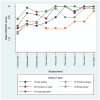"Like a doctor, like a brother": Achieving competence amongst lay health workers delivering community-based rehabilitation for people with schizophrenia in Ethiopia
- PMID: 33630893
- PMCID: PMC7906313
- DOI: 10.1371/journal.pone.0246158
"Like a doctor, like a brother": Achieving competence amongst lay health workers delivering community-based rehabilitation for people with schizophrenia in Ethiopia
Abstract
Background: There are gaps in our understanding of how non-specialists, such as lay health workers, can achieve core competencies to deliver psychosocial interventions in low- and middle-income countries.
Methods: We conducted a 12-month mixed-methods study alongside the Rehabilitation Intervention for people with Schizophrenia in Ethiopia (RISE) pilot study. We rated a total of 30 role-plays and 55 clinical encounters of ten community-based rehabilitation (CBR) lay workers using an Ethiopian adaptation of the ENhancing Assessment of Common Therapeutic factors (ENACT) structured observational rating scale. To explore factors influencing competence, six focus group discussions and four in-depth interviews were conducted with 11 CBR workers and two supervisors at three time-points. We conducted a thematic analysis and triangulated the qualitative and quantitative data.
Results: There were improvements in CBR worker competence throughout the training and 12-month pilot study. Therapeutic alliance competencies (e.g., empathy) saw the earliest improvements. Competencies in personal factors (e.g., substance use) and external factors (e.g., assessing social networks) were initially rated lower, but scores improved during the pilot. Problem-solving and giving advice competencies saw the least improvements overall. Multimodal training, including role-plays, field work and group discussions, contributed to early development of competence. Initial stigma towards CBR participants was reduced through contact. Over time CBR workers occupied dual roles of expert and close friend for the people with schizophrenia in the programme. Competence was sustained through peer supervision, which also supported wellbeing. More intensive specialist supervision was needed.
Conclusion: It is possible to equip lay health workers with the core competencies to deliver a psychosocial intervention for people with schizophrenia in a low-income setting. A prolonged period of work experience is needed to develop advanced skills such as problem-solving. A structured intervention with clear protocols, combined with peer supervision to support wellbeing, is recommended for good quality intervention delivery. Repeated ENACT assessments can feasibly and successfully be used to identify areas needing improvement and to guide on-going training and supervision.
Conflict of interest statement
The authors have declared that no competing interests exist.
Figures
Similar articles
-
Community-based rehabilitation intervention for people with schizophrenia in Ethiopia (RISE): a 12 month mixed methods pilot study.BMC Psychiatry. 2018 Aug 3;18(1):250. doi: 10.1186/s12888-018-1818-4. BMC Psychiatry. 2018. PMID: 30075715 Free PMC article.
-
Community-based rehabilitation intervention for people with schizophrenia in Ethiopia (RISE): results of a 12-month cluster-randomised controlled trial.Lancet Glob Health. 2022 Apr;10(4):e530-e542. doi: 10.1016/S2214-109X(22)00027-4. Lancet Glob Health. 2022. PMID: 35303462 Free PMC article. Clinical Trial.
-
Development of a Community-Based Rehabilitation Intervention for People with Schizophrenia in Ethiopia.PLoS One. 2015 Nov 30;10(11):e0143572. doi: 10.1371/journal.pone.0143572. eCollection 2015. PLoS One. 2015. PMID: 26618915 Free PMC article.
-
A study of human resource competencies required to implement community rehabilitation in less resourced settings.Hum Resour Health. 2017 Sep 22;15(1):70. doi: 10.1186/s12960-017-0240-1. Hum Resour Health. 2017. PMID: 28938909 Free PMC article. Review.
-
Determining the vocational competencies required to deliver community-based rehabilitation and inclusive development services in India.Disabil Rehabil. 2022 Aug;44(17):4929-4943. doi: 10.1080/09638288.2021.1907622. Epub 2021 May 4. Disabil Rehabil. 2022. PMID: 33945364 Review.
Cited by
-
Improving outcomes for people who are homeless and have severe mental illness in Ethiopia, Ghana and Kenya: overview of the HOPE programme.Epidemiol Psychiatr Sci. 2025 Apr 21;34:e26. doi: 10.1017/S2045796025000186. Epidemiol Psychiatr Sci. 2025. PMID: 40255198 Free PMC article.
-
Knowledge of Problem Solving (KOPS) Scale: Design and Evaluation of a Digitally Administered Competence Measure for a Common Practice Element in Task-Shared Youth Mental Health Interventions.J Technol Behav Sci. 2024;9(3):418-427. doi: 10.1007/s41347-023-00356-9. Epub 2023 Oct 21. J Technol Behav Sci. 2024. PMID: 39161658 Free PMC article.
-
Peer-led recovery groups for people with psychosis in South Africa (PRIZE): protocol for a randomised controlled feasibility trial.Pilot Feasibility Stud. 2023 Feb 1;9(1):19. doi: 10.1186/s40814-022-01232-8. Pilot Feasibility Stud. 2023. PMID: 36726164 Free PMC article.
-
Community-based rehabilitation intervention for people with schizophrenia in Ethiopia (RISE) cluster-randomised controlled trial: An exploratory analysis of impact on food insecurity, underweight, alcohol use disorder and depressive symptoms.Glob Ment Health (Camb). 2023 Oct 23;10:e70. doi: 10.1017/gmh.2023.67. eCollection 2023. Glob Ment Health (Camb). 2023. PMID: 38024800 Free PMC article.
-
Siyakhana: A hybrid type 2 effectiveness-implementation stepped-wedge trial to reduce stigma towards substance use and depression among community health workers in HIV/TB care in South Africa.J Subst Use Addict Treat. 2025 Apr;171:209634. doi: 10.1016/j.josat.2025.209634. Epub 2025 Jan 31. J Subst Use Addict Treat. 2025. PMID: 39892671 Free PMC article. Clinical Trial.
References
-
- Kakuma R, Minas H, van Ginneken N, Dal Poz MR, Desiraju K, Morris JE, et al.. Human resources for mental health care: current situation and strategies for action. The Lancet. 2011;378(9803):1654–63. - PubMed
-
- van Ginneken N, Tharyan P, Lewin S, Rao GN, Meera SM, Pian J, et al.. Non-specialist health worker interventions for the care of mental, neurological and substance-abuse disorders in low- and middle-income countries. Cochrane Database Syst Rev. 2013;11:CD009149. 10.1002/14651858.CD009149.pub2 - DOI - PubMed
-
- Rahman A, Malik A, Sikander S, Roberts C, Creed F. Cognitive behaviour therapy-based intervention by community health workers for mothers with depression and their infants in rural Pakistan: a cluster-randomised controlled trial. Lancet. 2008;372(9642):902–9. 10.1016/S0140-6736(08)61400-2 - DOI - PMC - PubMed
Publication types
MeSH terms
Associated data
Grants and funding
LinkOut - more resources
Full Text Sources
Other Literature Sources
Medical
Miscellaneous





